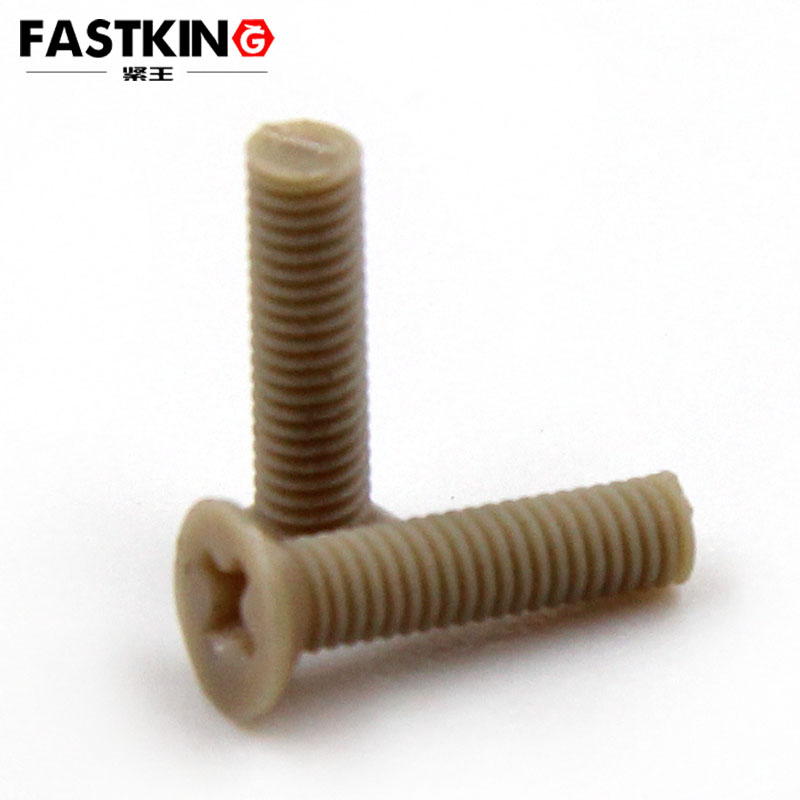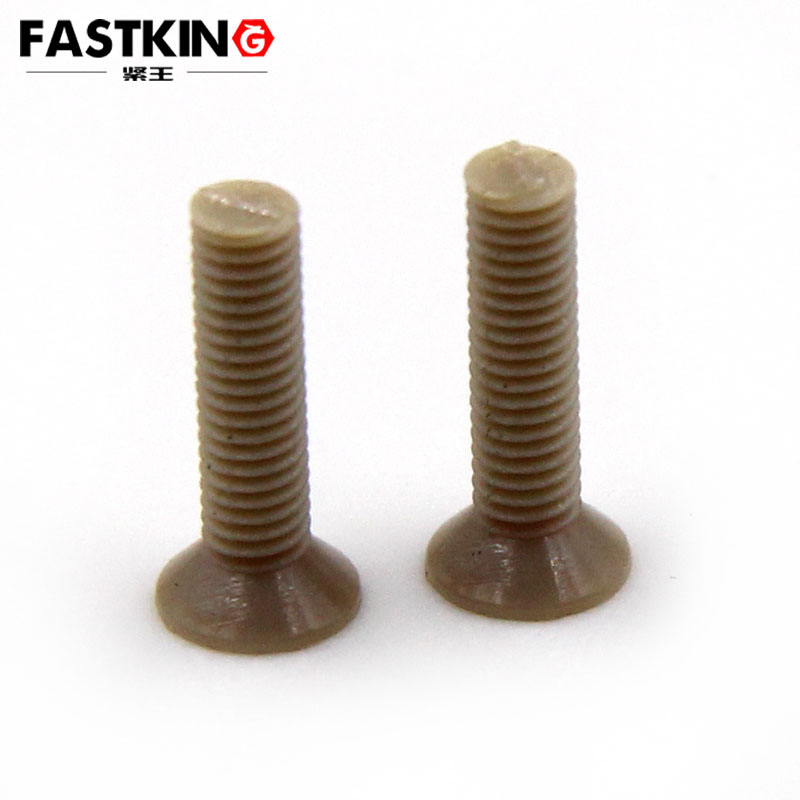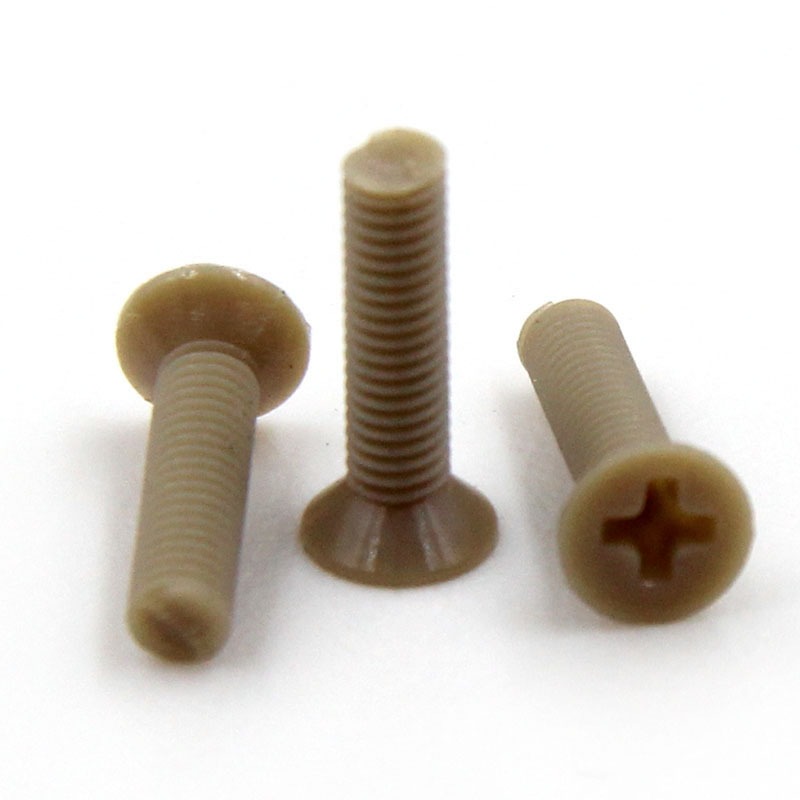cross countersunk head screw
Product Description : PEEK cross countersunk head screw
Aerospace Field: Structural Stability Guarantee Under Extreme Environments
The engine compartments, airframe structures, and electronic systems of aerospace equipment are long-term exposed to extreme environments of high temperature, high pressure, and strong vibration, imposing extremely high requirements on the weather resistance and reliability of fasteners. The PEEK Phillips countersunk screw plays a crucial role in this field: Inside the engine compartment, it can withstand a continuous operating temperature of 260℃, and its short-term temperature resistance can even reach over 300℃, far exceeding the heat resistance limit of metal screws. It can stably fix core components such as fuel pipelines and sensors, avoiding material softening or fracture caused by high temperatures. In the fixation of external radar domes and satellite antennas on the airframe, the UV aging resistance and high-altitude low-temperature resistance of PEEK material can cope with the day-night temperature difference of -50℃ to 150℃. Unlike metal screws, it will not undergo stress deformation due to temperature alternation, ensuring the long-term stable operation of the equipment.
Meanwhile, the concealed design of the Phillips countersunk structure can prevent the protruding screw head from interfering with airflow or radar signal transmission. For example, in the skin assembly of UAV wings, PEEK Phillips countersunk screws can be completely embedded in the skin surface, reducing air resistance while avoiding the impact of protruding parts on the flight attitude. Its Phillips drive slot is compatible with universal screwdrivers, facilitating quick operation by astronauts or ground maintenance personnel and improving maintenance efficiency.
Medical Equipment Field: Adaptation to Biocompatibility and Clean Environments
Medical equipment (such as surgical instruments, diagnostic instruments, and implantable devices) has nearly harsh requirements for the biocompatibility, corrosion resistance, and cleanliness of fasteners, and the PEEK Phillips countersunk screw perfectly meets these needs. In the fixation of robotic arm joints of surgical robots, PEEK material has passed FDA biocompatibility certification, showing no toxicity or sensitization when in contact with human tissues, and is resistant to corrosion by disinfectants. Even after long-term sterilization with high-temperature and high-pressure steam (134℃) or strong oxidizing disinfectants, it will not experience material degradation or rust, ensuring the cleanliness and safety of surgical instruments. In the fixation of internal coils of magnetic resonance imaging (MRI) equipment, the low magnetic property of PEEK material can avoid interfering with magnetic field signals, ensuring diagnostic accuracy. Additionally, the countersunk design prevents the protruding screw from affecting coil arrangement, reducing signal interference during equipment operation.
Furthermore, in the auxiliary fixation of implantable devices such as dental implants and orthopedic internal fixation plates, the high strength and toughness of PEEK Phillips countersunk screws can match the mechanical properties of human bones, avoiding the stress shielding problem caused by long-term implantation of metal screws. At the same time, its resistance to body fluid corrosion can extend the service life of implantable devices.
High-End Electronics Field: Low-Interference Choice for Precision Assembly
High-end electronic equipment such as 5G base stations, new energy vehicle battery management systems (BMS), and semiconductor manufacturing equipment have prominent demands for "insulation, low interference, and small size" of fasteners, making the PEEK Phillips countersunk screw an ideal choice. In the assembly of radio frequency (RF) modules of 5G base stations, the excellent insulation of PEEK material can avoid signal short circuits or interference caused by metal screws, ensuring the stable transmission of RF signals. Its Phillips countersunk structure can be completely embedded in the module surface, preventing protruding parts from contacting other components and reducing the risk of circuit short circuits.

Inside the battery packs of new energy vehicles, PEEK Phillips countersunk screws can withstand the high temperature of 120-180℃ generated during battery charging and discharging, and are resistant to electrolyte corrosion. They can stably fix battery cells and heat sinks, preventing material corrosion caused by electrolyte leakage. In the vacuum chambers of semiconductor wafer manufacturing equipment, the low volatility and plasma corrosion resistance of PEEK material can prevent screw volatiles from contaminating the wafer surface, ensuring chip manufacturing accuracy. The Phillips drive design also facilitates quick disassembly and maintenance in clean rooms.
Chemical Industry and High-End Manufacturing Field: Adaptation to Corrosion Resistance and Lightweight
Equipment in chemical production (such as reactors and pipeline valves) as well as high-end molds and textile machinery are in long-term contact with strong acids, strong alkalis, or organic solvents. Traditional metal screws are prone to corrosion and failure, while the PEEK Phillips countersunk screw shows significant advantages in corrosion resistance in such scenarios. In the fixation of reactor liners in chemical production, PEEK material can withstand highly corrosive media such as sulfuric acid and nitric acid, and unlike stainless steel screws, it will not cause intergranular corrosion, ensuring the sealing performance and operational safety of the reactor. In the fixation of fabric guide rollers in textile printing and dyeing equipment, its resistance to dye and high-temperature steam corrosion can prevent fabric contamination by rusted screws, improving product quality.

At the same time, the density of PEEK material is only 1.32g/cm³, approximately 1/5 that of metal. In the lightweight design of high-end molds, the use of PEEK Phillips countersunk screws can significantly reduce the overall weight of the mold, lowering equipment operating energy consumption. The Phillips countersunk structure is compatible with batch screwing in automated assembly lines, which can improve the assembly efficiency of mold production and reduce labor costs.
It can be seen from the applications in various fields that the value of PEEK Phillips countersunk screws lies not only in "fastening" but also in their ability to break through environmental limitations and adapt to high-precision demands. With the technological upgrading of aerospace, medical, electronics, and other fields, the performance requirements for fasteners will further increase. The combination of PEEK material and Phillips countersunk structure will also expand its applications in more extreme and precision scenarios, becoming a "weather-resistant fastening tool" that promotes the stable operation of high-precision equipment.

